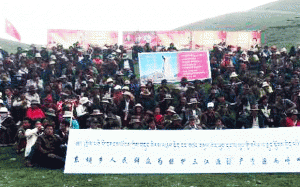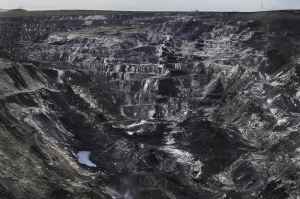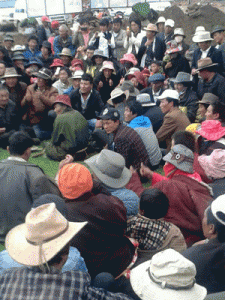Tibetans Protest Against Coal Mining in Nangchen County
More than 100 Tibetans protested this week against coal mining in Qinghai province’s Nangchen (in Chinese, Nangqian) county, citing environmental and health concerns, according to sources.
Carrying banners and shouting slogans, the villagers gathered on Tuesday and Wednesday at the mining site in Dompa township under the Yulshul (Yushu) Tibetan Autonomous Prefecture in order express their opposition to any resumption of activity.

A section of the protesters calling for a halt to coal mining in Qinghai province’s Nangchen county, Aug 6, 2014.
Photo courtesy of an RFA listener
They told Chinese officials at the protest site in Goshung Ruchen village that the mining activities contradicted directives from the country’s leaders pushing for the protection of the environment. Some of them unfurled banners with quotes of leaders stressing environmental protection.
“A spokesperson for the Tibetans argued and reasoned with the officials who arrived to listen to their grievances,” a resident told RFA’s Tibetan Service.
“The Tibetan protestors carried banners on which were statements by President Xi Jinping on the protection of environment and on the need to avoid haphazard exploitation of minerals,” the resident said, speaking on condition of anonymity.
“Some of the protesters became emotional and wept in a state of desperation,” he said. “The Chinese officials were concerned and promised to take up their concerns with the higher authorities and asked the crowd to disperse.”
The Tibetans have been worried about the prospect of mining activities being stepped up in three sites—Gongshung Ruchen Menmar Norbuma, Droglung Okar, and Ahge Kyilung—since a group of mining officials suddenly arrived at villages in Nangchen on Monday, sources said.
“The local Tibetans were suspicious about their intentions. They later discovered that the officials came to the area with the objective of stepping up coal mining activities at the three sites,” another Tibetan in the area said.
In June, Tashi Dhargye, the Tibetan head of Nangchen county, and some Chinese officials arrived at Dompa township to convince villagers that prefecture level authorities had given their backing to coal mining in the area.
“The Tibetan people were told not to put up resistance but extend their cooperation,” the Tibetan source said.
Indiscriminate dumping of waste
Coal mining in the area began in 2000 and indiscriminate dumping of wastes led to health problems among villagers, sources said. Monks and other local Tibetans protested against the mining operations, resulting in their suspension for a short period.
Tibetan areas of China have become an important source of minerals needed for China’s economic growth, and mining operations have led to frequent standoffs with Tibetans who accuse Chinese firms of disrupting sites of spiritual significance and polluting the environment as they extract local wealth.
Last month, residents of Karsel village in Chabcha (in Chinese, Gonghe) county in the Tsolho (Hainan) Tibetan Autonomous Prefecture in Qinghai province protested against a Chinese white marble mining operation that had run beyond its leasing contract and had begun to encroach on sacred sites.
Chinese miners have been digging for white marble in the Karsel village area since about 1989, and continued to excavate even after the end of a contract that allowed them to work, sources had said.
Also last month, police in southwestern Yunnan province attacked and beat a group of Tibetan women who had gathered to protest copper mining on land considered sacred by residents living near the site, sources said.
The women had protested after Chinese authorities dismissed repeated appeals by Tibetans living in Dechen (in Chinese, Diqing) Tibetan Autonomous Prefecture’s Dechen (Deqin) county to halt the excavations, a local source said.
Reported by Lhuboom for RFA’s Tibetan Service. Translated by Karma Dorjee. Written in Engliah by Parameswaran Ponnudurai.



comment 0